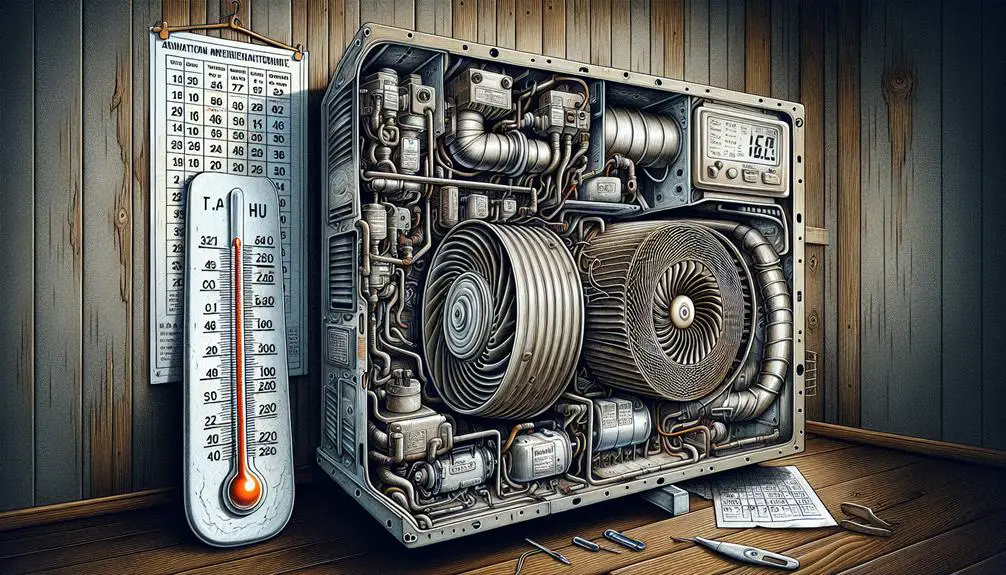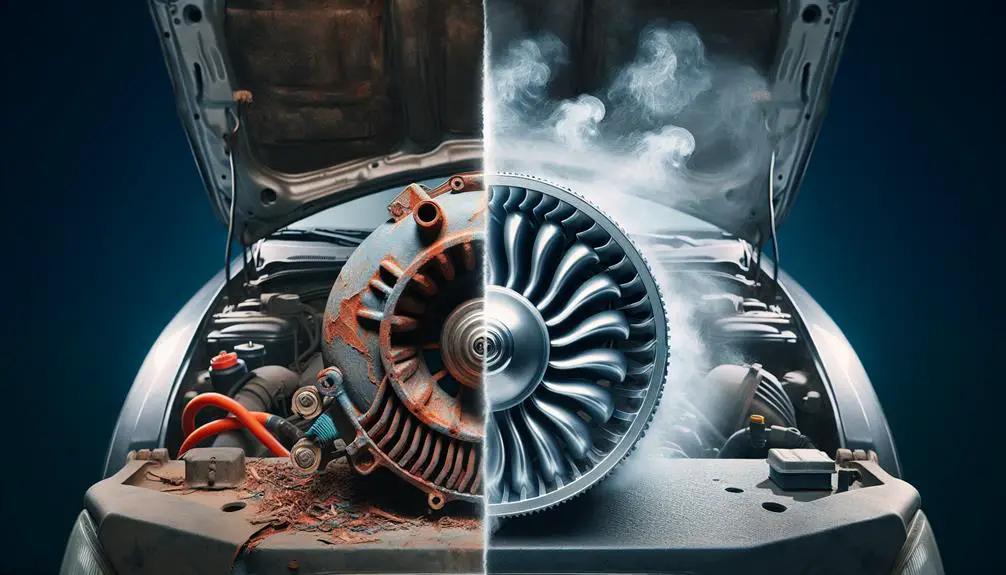Yes, a blower motor can get weak. Nearly 40% of HVAC system failures are attributed to motor issues, highlighting how important these components are to your home's comfort.
If you've noticed your heating or cooling system isn't performing as efficiently as it once did, it's possible your blower motor is weakening. This decline can stem from different factors, ranging from regular wear and tear to more severe electrical problems.
Understanding the signs of a faltering blower motor, its common causes, and the impact on your HVAC's performance is vital. Equipped with this knowledge, you'll be better positioned to decide whether maintenance or a complete replacement is necessary.
Explore further to make sure your home remains a sanctuary of comfort.
Signs of a Weakening Blower Motor

When your blower motor starts to weaken, you'll likely notice several telltale signs indicating it's time for a checkup or replacement. The most obvious symptom is a decrease in airflow through your vehicle's vents. You might crank up the fan to the highest setting, expecting a strong gust of air, but instead, you're met with a weak flow or perhaps nothing at all. This can be particularly noticeable during extreme weather conditions when you need your heating or air conditioning the most.
Another sign you can't ignore is unusual noises coming from the blower motor. If it's on its way out, you might hear squealing, rattling, or banging sounds when you try to use your heater or air conditioner. These noises suggest that the motor's internal components are struggling to operate correctly.
You might encounter erratic behavior from your blower motor. This could include the fan speed changing randomly without your input or the fan turning on and off by itself. Such inconsistencies can be frustrating and are a clear signal that something's not right.
Finally, a strange smell emanating from the vents can indicate a blower motor issue. If it's overheating, you might notice a burning or musty odor, which is definitely a cause for concern.
Each of these symptoms on their own mightn't seem like much, but together, they're a strong indication that your blower motor isn't performing as it should. Ignoring these signs could lead to further discomfort and potentially more significant issues down the line.
Common Causes of Wear
Grasping the common causes of wear in your blower motor can help you prevent premature failure and maintain peak performance. One significant factor is dust and debris build-up. Over time, dirt accumulates on the blower's components, making it work harder and wear out faster. You'll want to keep an eye on your system's filters and replace them regularly to lessen this issue.
Another culprit behind wear and tear is poor lubrication. The blower motor relies on lubricants to operate smoothly. If it's not well-lubricated, friction increases, leading to overheating and eventual breakdown. Make sure you're checking the lubrication levels during routine maintenance to avoid this problem.
Electrical issues, such as voltage fluctuations, can also take a toll on your blower motor. Surges in power may strain the motor's electrical components, reducing its lifespan. It's wise to have a professional inspect your electrical connections and safeguard your system against unpredictable power spikes.
In addition, wear can stem from simply overusing your system. Constant operation without breaks puts immense strain on the blower motor, accelerating wear. Giving your HVAC system periodic rests and not overburdening it during extreme weather conditions can help prolong its life.
Impact on HVAC Performance
Knowing the common causes of wear in your blower motor sets the stage for recognizing how these issues directly impact your HVAC system's complete performance. When your blower motor starts to weaken, you'll notice a series of tell-tale signs that something's not quite right. Your system's efficiency takes a hit, making it harder to maintain your home's comfort levels. This struggle isn't just about comfort; it's further about higher energy bills. As your system works harder to push air through, it consumes more power, leading to an uptick in your monthly expenses.
You might experience uneven heating or cooling. A weakened blower motor doesn't distribute air as effectively, some rooms might feel too hot or too cold, despite what your thermostat reads. This inconsistency can turn your living space into a patchwork of uncomfortable zones, no matter how much you fiddle with the settings.
Then there's the noise. A struggling blower motor often makes more noise than one in good condition. If you're hearing unusual sounds coming from your HVAC system, it's likely a sign that the blower motor is having a hard time. This noise isn't just a nuisance; it's a call to action, signaling that your system's performance is compromised.
Maintenance Tips
To maintain your blower motor in top condition, regularly scheduled maintenance is crucial. It's not just about guaranteeing comfort in your home; it's also about maximizing the lifespan of your HVAC system. Here are some vital tips to keep your blower motor running smoothly.
Initially, you've got to keep it clean. Dust and debris can build up over time, causing your blower motor to work harder than it needs to. This not only leads to inefficiency but can also shorten the life of the motor. Make it a habit to clean or replace your air filters every few months, depending on usage and the type of filter you're using. A clean filter will prevent excessive dirt from reaching the blower motor.
Next, listen for unusual noises. If you're hearing rattling or humming from your HVAC system, it could be a sign that your blower motor is struggling. These sounds can indicate loose parts or obstructions that need to be cleared. Don't ignore them; these noises are your primary clue that something's not right.
Furthermore, ensure that your system's ductwork is in good condition. Leaks or blockages can force your blower motor to overcompensate, leading to unnecessary strain. Periodic inspections by a professional can help identify and resolve these issues before they cause significant damage.
Repair or Replace Decision

When your blower motor shows signs of trouble, you're faced with a critical decision: repair it or replace it entirely. This choice isn't always straightforward. You've got to weigh the pros and cons, considering both your budget and the motor's lifespan. Let's break down the factors that'll guide your decision:
- Age of the Motor: If your blower motor is relatively young, with years of expected service left, a repair might make more sense. However, if it's pushing its expected lifespan, replacing it could save you from future headaches.
- Cost Comparison: Compare the repair cost with the price of a new blower motor. A good rule of thumb is if the repair costs are over half the price of a new one, you're better off replacing it. This way, you're not just patching up an aging system but investing in reliability.
- Energy Efficiency: Newer models are often more energy-efficient. If your old blower motor guzzles more power than it should, upgrading to a newer model could lower your energy bills in the long run.
Deciding between repair or replacement isn't just about immediate costs; it's about considering the future, too. If you opt for a repair, make sure you're not just delaying the inevitable. Conversely, if you choose to replace, see it as an investment in your comfort and your home's efficiency. Whatever you decide, make sure it's a choice you're comfortable with both today and down the road.
Conclusion
Absolutely, your blower motor can get weak over time. Watch for signs like reduced airflow or strange noises, often because of wear or blockages.
This weakening can greatly impact your HVAC's efficiency, leading to discomfort and higher energy bills. Regular maintenance can extend its life, but if it's beyond repair, replacing it might be your best bet.
Remember, a healthy blower motor means a comfortable, energy-efficient home. So, keep an eye out and act promptly to address any issues.